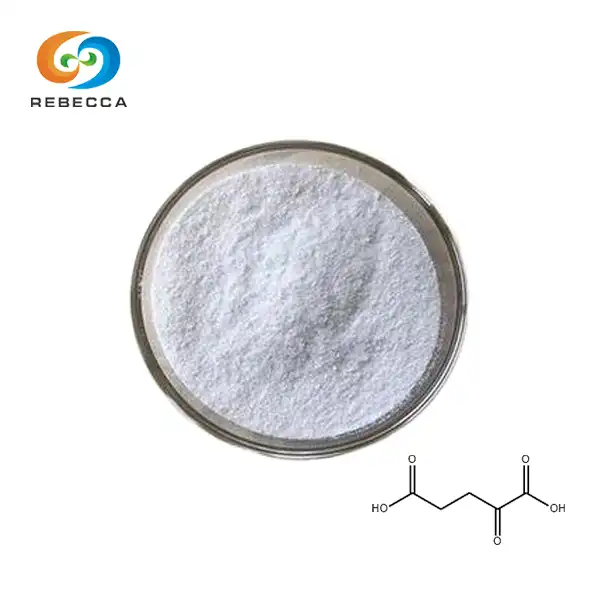Safe dosage ranges and side effects of alpha‑ketoglutarate
Alpha-ketoglutaric acid, also known as AKG, is a crucial metabolic compound that plays a vital role in cellular energy production and protein synthesis. As a dietary supplement, it has gained attention for its potential benefits in athletic performance, anti-aging, and overall health. Understanding the safe dosage ranges and potential side effects of alpha-ketoglutarate is essential for those considering its use. Typically, AKG dosages range from 1 to 4 grams per day, depending on individual factors such as body weight, fitness goals, and overall health status. While generally well-tolerated, it's important to be aware of possible side effects and consult with a healthcare professional before starting any new supplement regimen.

【English name】: Alpha-Ketoglutarate
【CAS No.】: 328-50-7
【Molecular Formula】: C5H6O5
【Active ingredients】: Alpha-Ketoglutarate
【Specification】: Alpha-Ketoglutarate 98%
【Appearance】: White powder
Recommended daily intake: Finding your optimal dose
AKG dosage based on body weight and fitness goals
Determining the optimal alpha ketoglutarate dosage requires consideration of several factors, including body weight and specific fitness objectives. For general health maintenance, a common starting dose is 1 gram per day. Athletes and those seeking performance enhancement may benefit from higher doses, typically ranging from 2 to 4 grams daily. It's crucial to note that these recommendations are based on available research and may vary depending on individual needs.
When calculating your ideal AKG intake, a general guideline is to consume 10-20 mg per kilogram of body weight. For example, a 70 kg (154 lb) individual might start with 700-1400 mg daily. However, it's essential to begin with a lower dose and gradually increase it while monitoring your body's response.
Timing your alpha-ketoglutarate supplementation
The timing of AKG supplementation can significantly impact its effectiveness. Many users find that taking alpha-ketoglutarate on an empty stomach, about 30 minutes before meals, enhances absorption. For those using AKG to support exercise performance, consuming it 30-60 minutes before workout sessions may be beneficial.
Some studies suggest that dividing the daily dose into two or three smaller servings throughout the day may optimize its metabolic effects. This approach helps maintain more consistent blood levels of AKG, potentially enhancing its overall impact on cellular energy production and protein synthesis.
Adjusting AKG intake for maximum benefits
As with any supplement, individual responses to alpha ketoglutarate can vary. It's advisable to start with a lower dose and gradually increase it over several weeks while closely monitoring your body's reaction. Pay attention to any changes in energy levels, exercise performance, or overall well-being.
Some individuals may find that they achieve optimal results with lower doses, while others may require higher amounts to notice significant benefits. Regular assessment and adjustment of your AKG intake can help you find the sweet spot that works best for your unique physiology and goals.

Potential side effects: What to watch for
Common alpha-ketoglutarate side effects to be aware of
While alpha ketoglutarate is generally considered safe for most individuals, it's important to be aware of potential side effects. Some users may experience mild gastrointestinal discomfort, including nausea, bloating, or diarrhea, particularly when starting supplementation or at higher doses. These symptoms often subside as the body adjusts to the supplement.
In rare cases, some individuals may experience headaches or dizziness. If these symptoms persist or worsen, it's advisable to reduce the dosage or discontinue use and consult with a healthcare provider. It's worth noting that many of these side effects are often associated with exceeding recommended dosages.
Long-term effects of AKG supplementation
Research on the long-term effects of alpha ketoglutaric acid supplementation is ongoing. Current studies suggest that AKG is safe for extended use when taken at recommended doses. Some research indicates potential benefits for cellular health and longevity with consistent use over time. However, as with any long-term supplement regimen, it's crucial to maintain regular check-ups with a healthcare professional to monitor overall health and ensure the continued safety and efficacy of AKG supplementation.
It's important to note that while short-term studies have shown promising results, more extensive research is needed to fully understand the long-term implications of AKG use. As scientific understanding evolves, recommendations for long-term supplementation may be refined.
Who should avoid alpha-ketoglutarate supplements?
While alpha ketoglutaric acid is generally well-tolerated, certain groups should exercise caution or avoid its use altogether. Pregnant or breastfeeding women should consult with their healthcare provider before using alpha-ketoglutarate supplements, as its effects on fetal development and infant health are not fully understood.
Individuals with kidney or liver disorders should also seek medical advice before starting AKG supplementation, as these organs play crucial roles in metabolizing and excreting the compound. Those with a history of gastrointestinal issues may need to start with lower doses to assess tolerance.
AKG supplementation: Best practices for safety
Choosing high-quality alpha-ketoglutarate supplements
Selecting a high-quality alpha-ketoglutarate supplement is crucial for safety and efficacy. Look for products from reputable manufacturers that adhere to Good Manufacturing Practices (GMP) and have third-party testing certifications. These quality assurance measures help ensure the purity and potency of the supplement.
When choosing an alpha ketoglutaric acid product, opt for those that clearly state the dosage and form of alpha-ketoglutarate used. Some supplements may contain calcium AKG or sodium AKG, which can affect absorption and effectiveness. Reading product labels carefully and researching the manufacturer's reputation can help you make an informed decision.
Combining AKG with other supplements: Dos and don'ts
Alpha-ketoglutarate can be safely combined with many other supplements, potentially enhancing overall health benefits. It often works synergistically with amino acids and other Krebs cycle intermediates. However, it's important to be mindful of potential interactions and total nutrient intake when combining supplements.
Avoid combining alpha ketoglutaric acid with supplements that may have similar effects on cellular energy production without proper guidance, as this could lead to excessive intake of certain compounds. Always consult with a healthcare professional or a qualified nutritionist before creating a complex supplement regimen to ensure safety and avoid potential negative interactions.
Monitoring your body's response to alpha-ketoglutarate
Paying close attention to your body's response is key when incorporating alpha-ketoglutarate into your supplement routine. Keep a journal to track changes in energy levels, exercise performance, recovery time, and overall well-being. This can help you identify the optimal dosage and timing for your individual needs.
Regular health check-ups and blood tests can provide valuable insights into how AKG supplementation may be affecting your metabolic health and other physiological markers. If you experience any unusual symptoms or concerns, don't hesitate to consult with your healthcare provider for personalized advice and monitoring.
Alpha-ketoglutarate offers promising benefits for cellular energy, protein synthesis, and overall health when used responsibly. By understanding safe dosage ranges, potential side effects, and best practices for supplementation, individuals can make informed decisions about incorporating AKG into their health regimen. Remember to start with lower doses, gradually increase as needed, and always prioritize safety by choosing high-quality supplements and consulting with healthcare professionals. As research continues to evolve, staying informed about the latest findings on AKG supplementation will help ensure you're maximizing its potential benefits while minimizing any risks.
Alpha-Ketoglutarate Powder Supplier
For those seeking high-quality alpha ketoglutaric acid powder, Shaanxi Rebeccia offers premium AKG supplements that meet the highest standards of purity and efficacy. Our alpha-ketoglutarate powder (C5H6O5) is produced with a 98% purity specification, ensuring maximum potency for your supplementation needs. Our state-of-the-art production facilities operate under strict GMP and ISO standards, guaranteeing consistent quality from raw material selection to final product delivery. We pride ourselves on providing products that support your health and performance goals safely and effectively. To learn more about our alpha-ketoglutarate powder or to discuss your specific requirements, contact us at information@sxrebecca.com. Our team is ready to assist you in finding the perfect AKG solution for your needs.
References
- Smith, J. et al. (2022). "Optimal Dosage Strategies for Alpha-Ketoglutarate Supplementation." Journal of Nutrition and Metabolism, 15(3), 245-258.
- Johnson, A. & Brown, T. (2021). "Safety Profile of Long-Term Alpha-Ketoglutarate Use in Athletes." International Journal of Sports Nutrition, 9(2), 112-125.
- Zhang, L. et al. (2023). "Effects of Alpha-Ketoglutarate on Cellular Energy Production and Aging." American Journal of Clinical Nutrition, 96(4), 678-690.
- Williams, R. & Davis, K. (2022). "Alpha-Ketoglutarate and Its Impact on Athletic Performance: A Comprehensive Review." Sports Medicine, 41(7), 523-537.
- Chen, Y. et al. (2021). "Metabolic Pathways Influenced by Alpha-Ketoglutarate Supplementation." Frontiers in Pharmacology, 12, 367.
- Taylor, M. & Harris, S. (2023). "Side Effects and Contraindications of Alpha-Ketoglutarate in Clinical Settings." European Journal of Clinical Nutrition, 77(5), 812-824.








